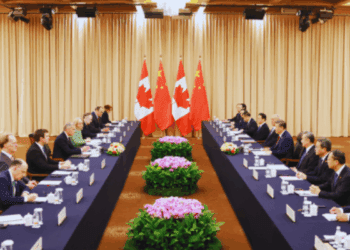 While one can debate the referendum tactic, it should be clear that opposition to equalization is a symptom and not the root cause of Western anger, write Ken Coates and Heather Exner-Pirot in the Toronto Star.
While one can debate the referendum tactic, it should be clear that opposition to equalization is a symptom and not the root cause of Western anger, write Ken Coates and Heather Exner-Pirot in the Toronto Star.
By Ken Coates and Heather Exner-Pirot, October 28, 2021
Quite predictably, central Canada has been quick to dismiss Alberta’s referendum on equalization.
As Andrew Coyne wrote in the Globe and Mail the referendum is viewed as a “stunt” in the rest of the country, and in his view it’s best ignored. And Coyne can rest easy; equalization is constitutionally entrenched, technically intricate, and Quebec-friendly. It’s not going anywhere and no one in Alberta should have expected a different result, despite over 60 per cent of Albertans supporting its elimination.
But while one can debate the referendum tactic, it should be clear that opposition to equalization is a symptom and not the root cause of Western anger. This frustration is not just in Alberta. Saskatchewan is the new heartland of Canadian conservatism and a growing focal point for profound disappointment with federalism. Federal leaders can no longer ignore this.
The list of sensitive points is building: limited attention to the decline of the oil and gas industry, the complexities of pipeline politics, carbon taxes, the absence of a rural and small-town strategy, delays in building internet capacity, national obsession with central Canada metropolitan priorities, the lack of Western representation in the federal cabinet (so much so that there are now more former “Canada AM” hosts than MPs from Alberta at the cabinet table) and much more.
Western frustration and alienation is neither new nor surprising, going all the way back to Louis Riel and the Métis resistance. During times of Liberal rule, the West has had a tiny set of Liberal superministers — Lloyd Axworthy, Anne McLellan, Ralph Goodale, Jim Carr — whose primary job was to explain Ottawa to the Prairies and to deliver government investments.
Lingering and deepening Western frustration with Canada and the federal system is here to stay. Brushing off the equalization referendum will only fuel Western anger, entrenching the idea that Ottawa’s political priorities do not include Western Canada.
The issues at hand are serious and urgent. The federal government’s antipathy to Western Canadian oil and gas is well-documented. So, too, is Ontario and Quebec’s disinterest in an industry that has contributed substantially to Canadian prosperity. Perhaps Michigan’s efforts to block Enbridge’s Line 5 will provide proof of the West’s fundamental importance Canada.
The interests and needs of Western Canada require the same kind and intensity of concern that attends any number of vital topics. Federalism itself is potentially at stake.
But Western Canada is not a “problem.” The West has enormous resource potential, a vibrant agricultural economy, two fast growing and highly regarded metropolitan areas in Calgary and Edmonton, a steadily growing population, some of the country’s best higher education institutions, an intense entrepreneurial spirit, and other crucial assets. The West does not seek charity or sympathy. It desires, instead, recognition as a central partner in national development.
The reality of the West differs a great deal from the stereotypes. Far from being a laggard on climate change, the Western energy sector has made world-leading investments in lowering the environmental impact of oil and gas production.
The Western provinces have a great deal to do on the Indigenous front, but there have been creative initiatives with urban reserves, Indigenous equity funding, and First Nations social service delivery that could be models for other provinces.
There are also valuable initiatives underway on urban development, rural and small-town support, renewable energy projects, as well as major investments in nanotechnology, water management, infectious diseases, and more.
To put it simply, this is not your grandparents’ Western Canada.
Alberta is hurting — and the West is angry. The near total dismissal of the Liberal party by Western Canadians is simply the latest expression in regional disappointment. Equalization is the temporary focus for a simmering frustration with Canada.
The referendum is not an invitation to Canada to descend into the deep rabbit hole of equalization politics. Rather, it is a solid and defiant gesture of opposition to the national government and, even more powerfully, a poignant reminder that any version of federalism that ignores the West and leaves the region out of Canadian nation-building is simply not in the national interest.
Ken Coates is a Munk Senior Fellow with the Macdonald-Laurier Institute based in Saskatchewan. Heather Exner-Pirot is an MLI Fellow based in Alberta.





